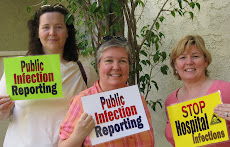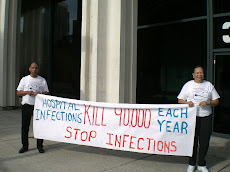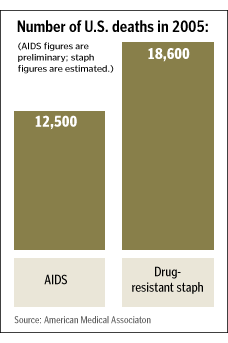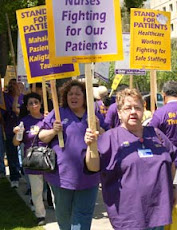 Actress Raises Awareness of Hospital Acquired Infections
Actress Raises Awareness of Hospital Acquired InfectionsBy Megan M. Krischke, contributor
When Alicia Cole, whose only experience with hospitals was playing the role of a nurse on the popular TV show, Beverly Hills 90210, entered the hospital on August 15, 2006, for a routine abdominal surgery, she was expecting a two-day stay and was, by her description, “as healthy as a horse.”
(Actress Alicia Cole poses with her parents shortly before her release from the hospital, where she contracted a life-threatening infection.)
But, it would be two months before Cole was able to leave the hospital and, even then, she was greatly debilitated and faced a long road to recovery.
Soon after her surgery Cole contracted Necrotizing Fasciitis (NF), also known as Man-Eating Flesh Disease, which is as bad as it sounds. NF is an infection, often hospital acquired, that causes rapid destruction of soft tissue and muscle. The condition is rare and deadly, with a reported mortality rate of 70 to 80 percent.
During the most acute phase of the disease, despite aggressive treatment, Cole’s condition was so fragile that her life was in jeopardy for several weeks. She promised herself that if she left the hospital alive she would make it her personal mission to increase awareness among both medical professionals and the public about hospital-acquired infections.
A year and a half has passed since she first entered the hospital and Cole is still recovering from the wounds caused by NF and the six surgeries that were required to stop its spread throughout her body.
Cole has created several Web sites, including a MySpace.com page that tell her story and assist with networking and sharing information. She has also met with California Governor Arnold Schwarzenegger’s Committee on Hospital Associated Infections to push for awareness and safeguards.
“I also try to help my fellow NF survivors by counseling with them. We help each other mentally and emotionally,” said Cole, a 15-year member of the Screen Actors Guild who co-starred on General Hospital and The Young and the Restless, and appeared on many prime time shows, including Veronica Mars and Beverly Hills 90210.
“It is a difficult adjustment to have your life completely altered in an instant and to realize your health will never be the same,” said Cole, who has had to put her acting career completely on hold. “There is a close fellowship among survivors. Family and friends can be a huge support, but no one besides a fellow survivor truly knows what you are going through.
“My wounds were so massive that about a third of my body was affected. It has been the longest, longest process; it is a very surreal experience,” Cole said of her illness. “I’ve always been an athlete and I’ve never gone this long without exercising. I try to keep my spirits up because it can be depressing.”
Cole doesn’t condemn the medical profession but feels there is always room for improvement and that in-service education is a must to reinforce skills and introduce cutting edge treatments for NF.
In her effort to increase awareness about hospital acquired infections and to lessen their occurrence, there are several areas Cole would like to see hospitals address:
Sanitation and hygiene
“Just like in every other job, nurses get busy and start to cut corners. Sanitation simply isn’t a corner you can cut if you work in the medical field,” said Cole.
Often this is just a matter of following standard procedures, such as always washing hands before working with a patient. Cole would also recommend nurses keep long hair tied back, fingernails short, and because she was so sensitive to odors during her illness, she thinks nurses should forgo perfume while at work.
Teamwork
Cole would like to see medical staff, patients and caregivers work more as a team and for everyone’s input and opinion to be valued. Cole’s mother was the first to find the telltale sign of NF, a black dot, near her daughter’s incision. The nurse on duty passed if off as nothing, but Cole’s mother insisted on calling in the doctor—a decision that saved Cole’s life.
“Whistle Blower” Protection
“I think it is extremely important that nurses be able to report things and answer patients’ questions without fear of reprisal,” Cole commented. “There were several instances in my case where nurses gave us valuable information, but prefaced it by saying, ‘Please don’t say anything because I could lose my job.’"
Wound Care
“Outside of wound care centers, it seems that many doctors and nurses aren’t informed on the advances in wound care,” Cole said. “They send you home with basic wet to dry dressings when there are so many more advanced healing techniques and so many medications that promote healing and regranulation of tissue,” Cole said. “I think a lot of secondary infections, bed sores and breakdown of wounds and skin tissue could be prevented or better treated if doctors and nurses were kept up-to-date on the latest innovations in wound care.”
Finally, Cole wants nurses to know that patients appreciate them.
“Sometimes patients are in pain and not getting good sleep. It may not always sound like we are happy to see you. And it is true, when I see you coming with a needle, I’m not happy to see you, but I appreciate the care you are giving me,” Cole explained.
© 2008. AMN Healthcare, Inc. All Rights Reserved









No comments:
Post a Comment